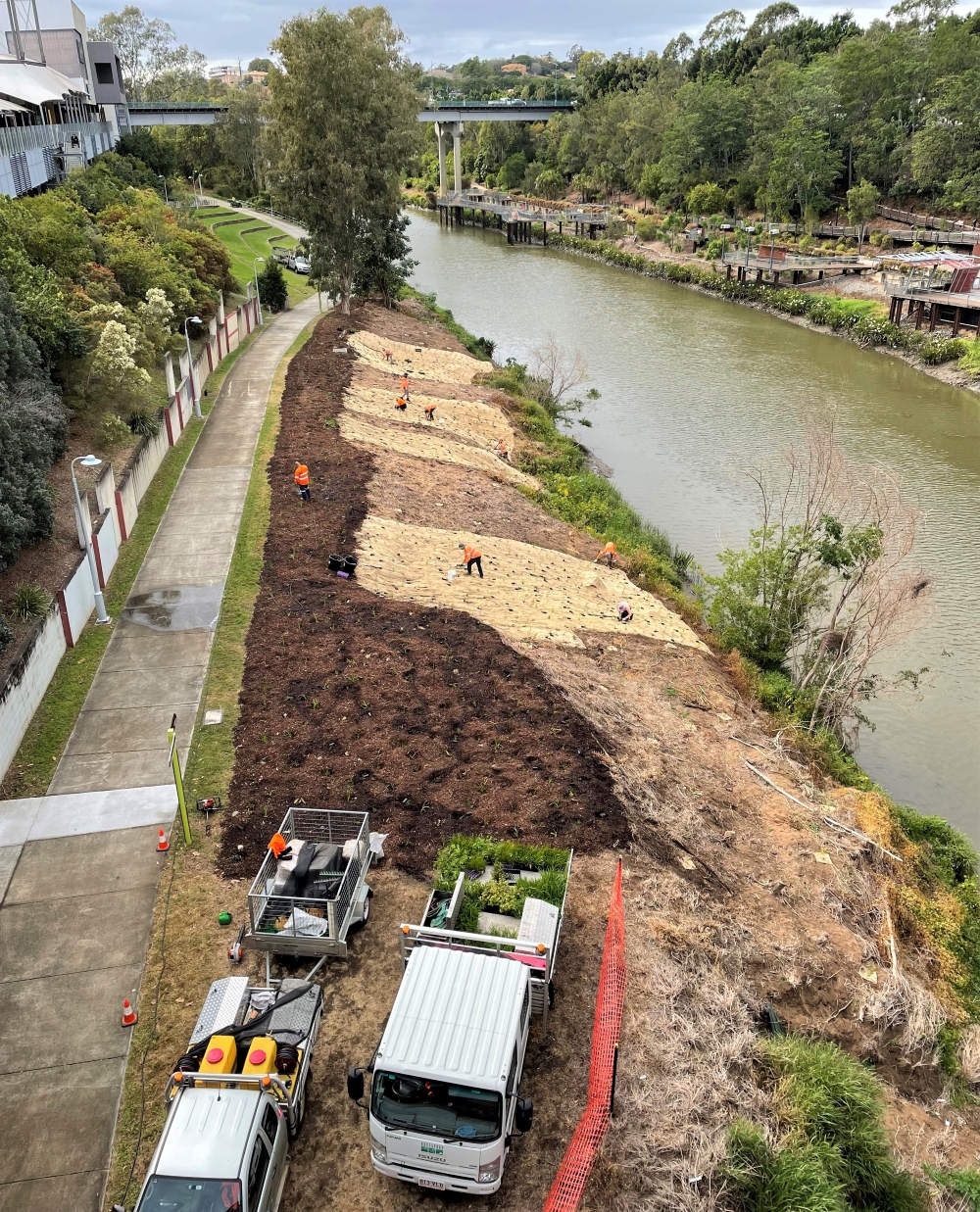Abseiling landscapers have removed thousands of overgrown weeds and tidied the riverbank underneath the Bradfield Bridge that connects Tulmur Place to Riverlink Shopping Centre.
The work, which began in March, required concentrated removal of weeds along a 100 metre stretch of the Bremer River, including sections only accessible by rappelling in harnesses attached to fixed points higher on the bank for safety.
Stage Two of this work has now been completed, which involved the planting of more than 4,000 native plants along this section of the riverbank.
Environment and Sustainability Committee Chair Councillor Russell Milligan said the intensive weeding and planting approach was all part of Council’s ongoing Habitat Connections Program.
“The banks of our amazing Bremer River have been identified as a priority area for rehabilitation, along with a number of other strategically important waterways across our city,” Cr Milligan said.
“Removing weeds and planting native vegetation provides natural improvements to our waterways, from enhancing water quality and animal habitats to reducing erosion and flood damage.”
Environment and Sustainability Committee Deputy Chair Councillor Andrew Fechner said more than $100,000 will be invested annually to improve riparian vegetation across Ipswich.
“The Habitat Connections program has undertaken dozens of strategic works across Ipswich to beautify and restore our urban waterways and provide community tree planting opportunities within waterway corridors,” Cr Fechner said.
“We must continue to manage and protect our waterway banks as a critical natural buffer against flooding and to help protect against new downstream weed infestations.”
Castor Oil, Leucauna and Glycine were among the weed species removed and replaced with native species such as Blue Gums, Lomandras, Bottlebrushes and Silky Oaks.
Some other unique native species such as Ipswich’s floral emblem, the Plunkett Mallee and the endangered Swamp Tea Tree were also included in the species planted.
Long term, Council plans to rehabilitate the entire town reach of the Bremer River by steadily working on sections of the riverbank over time.
Waterway improvement initiatives – Habitat Connections
Habitat Connections is a strategic creek rehabilitation program designed to beautify and restore degraded urban waterway corridors throughout Ipswich. This is being achieved through corridor tree planting, coupled with an ongoing maintenance program to ensure long lasting waterway improvements.
You can get actively involved at one of council’s tree planting events. Every tree will help make a difference to improving and preserving the health of our waterways. Register your interest via Council’s Volunteer Portal.
The revegetation works follow on from the removal of 75 abandoned trolleys from the river over the past year, as part of a joint operation between council and not-for-profit organisation Healthy Land and Water.
Cr Fechner said the persistent dumping of shopping trolleys into the Bremer River and its banks was of significant concern to the community and council.
“Dumped trolleys are serious environmental and amenity issues for the waterway and pose a genuine safety risk to River Heart Parklands visitors,” Cr Fechner said.
Cr Milligan said Council is committed to protecting and improving the natural environment of Ipswich.
“Council has a significant focus on investment in improving our waterways and has commissioned a clean-up program to remove trolleys along with any other rubbish encountered throughout the river.”
The 2020-2021 trolley clean-up program cost $9,000 for the three separate clean up events.
Read more

